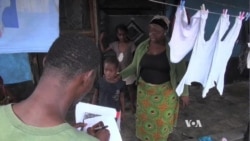The Ebola caseload continues to grow in Liberia’s capital, Monrovia, even as more people accept the disease and try to stay safe. Health workers are struggling to identify and isolate the sick before they can infect others.
The outbreak has paralyzed the country’s public health system, and existing Ebola treatment units are having to turn suspected cases away. And health volunteers are now even going door-to-door looking for the sick.
There was a brief celebration amid all the sickness and death when twelve Ebola survivors were released from the government-run ELWA-2 treatment unit.
Deputy Health Minister Tolbert Nyensuah said they are making progress every day in Monrovia but added to that the struggle is far from over.
“The fact is that transmission is still going on. I’m not saying that transmission has been broken. No, I cannot deceive the world,” said Nyensuah.
In an effort to outflank the virus health volunteers have started doing rounds in Monrovia’s West Point shantytown. They don’t use the word "Ebola" and introduce themselves casually.
“We are here on health matters,” said one in a group of volunteers stopping at a local home. “We want to know as to whether you have any sick persons. Somebody suffering from malaria, fever, typhoid, pressure?”
A resident responded that there were no sick people in the home.
It's the height of the malaria and typhoid season, and those people need care, but Ebola also has similar symptoms. Suspected cases must be found and taken to isolation, the volunteers say.
Back at the area’s health center, the waiting room is near empty. Staff say people are scared to come, scared it may be contaminated or that they may be taken to isolation.
Contact tracers deliver their reports. They have just visited about 150 people related to 30 suspected Ebola victims. Supervisor Marie Hiding says these daily follow-ups are chipping away at resistance.
“Because when you see someone going to your house every day [asking] ‘oh how are you coming on? Are you sick today? No.’ They will be happy to see us because they see that we care for them and we are concerned.”
The government lifted the quarantine on West Point on August 30.
Authorities barricaded the area after a mob attacked the holding center for suspected Ebola patients on August 17. The quarantine led to panic and was criticized as counterproductive.
But Liberia’s information minister, Lewis Brown, defended it.
“There was a level of denial that needed, in our mind, shock therapy, that needed to be awakened to the fact that 'look, this is deadly. This is serious. This is no hanky-panky business.'”
But as resistance fades, another challenge is amplified. Where can sick people go? Ebola treatment units in the capital are full. Doctors Without Borders is expanding one of the units to add 280 beds. Other agencies are building five more units to open later this month.





